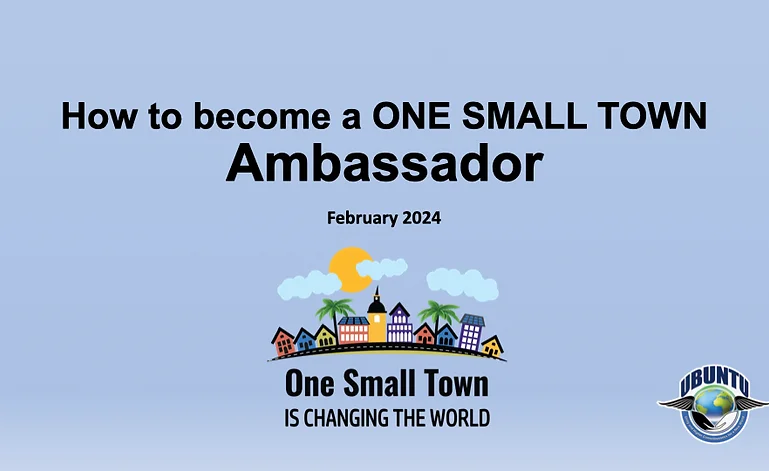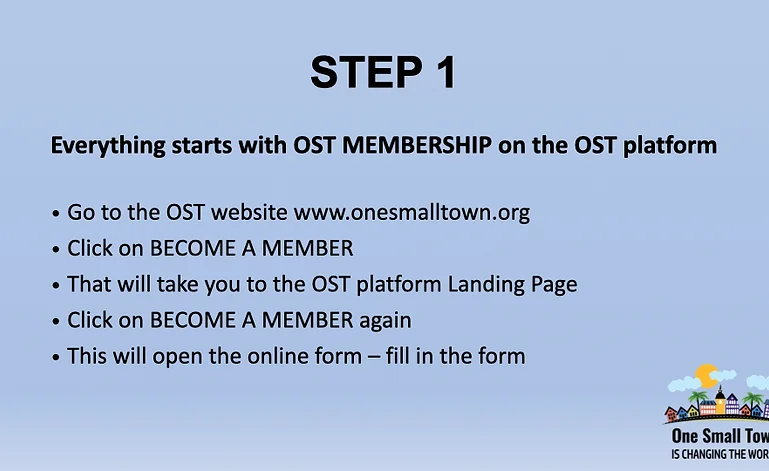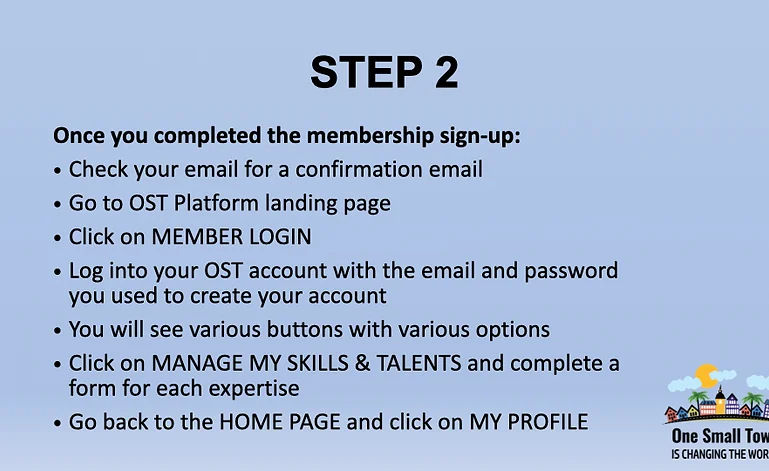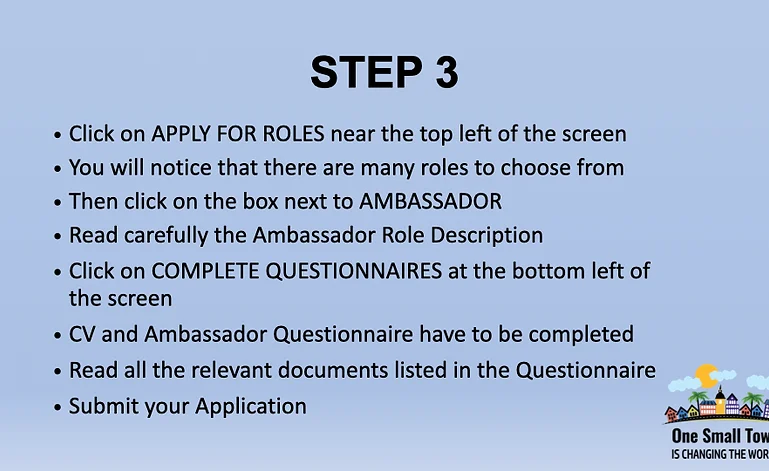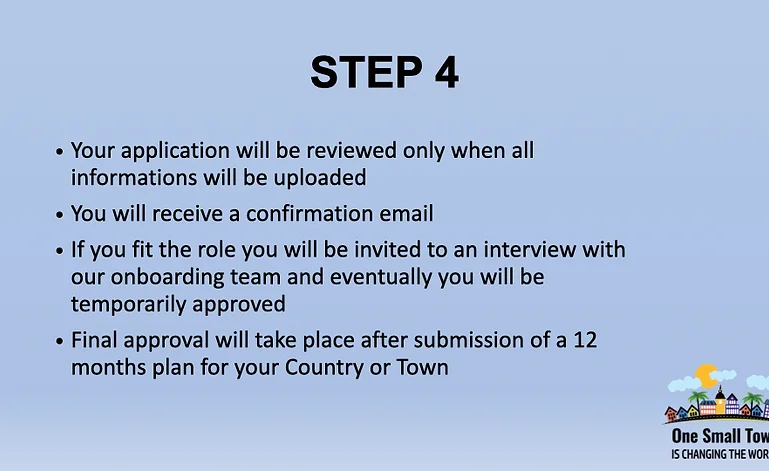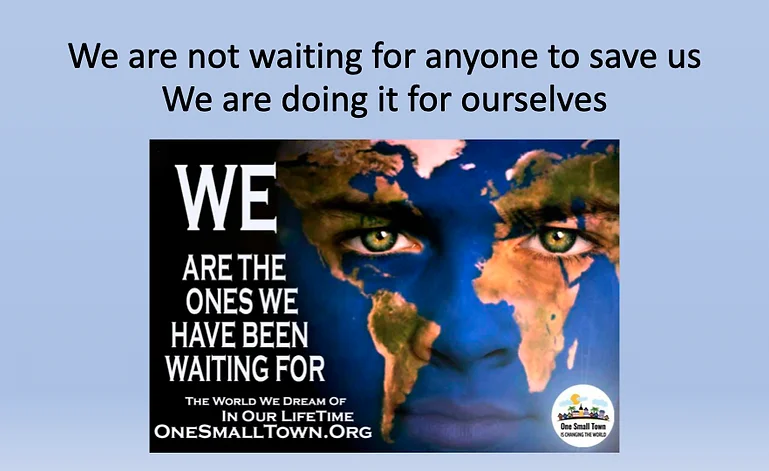How to become a ONE SMALL TOWN Ambassador.
Important Prerequisites
Before applying for the role of Ambassador, it’s important that you fully comprehend all aspects of the One Small Town initiative our history and present activity. Please ensure that you watch all the videos, workshops and read all documentation available on the website (www.onesmalltown.org).
We also recommend that you read the “UBUNTU Contributionism” book by Michael Tellinger for background knowledge. The book can be obtained here:
UBUNTU Contributionism book online
Overview of the One Small Town (OST) Ambassador Role
There are TWO types of OST Ambassadors:
- Town/Local Ambassador – Launching OST in a specific town
- Country Ambassador – Managing OST activities nationwide
NOTICE: In the USA every state will have its own State Ambassador that will perform the duties of a “Country Ambassador” – simply because of the size and state structure.
The Ambassador is the representative of OST in a specific designated town or country. You will be the voice and face of OST to build relationships with all possible stakeholders. Our stakeholders include community members, business owners, important community leaders, church leaders, investors, and if appropriate, mayors and other municipality or town council representatives.
The OST town/local Ambassador is the key point of contact ensuring, community awareness, local buy-in, and commitment to the OST vision, its implementation, as well as working alongside their country’s leadership team to establish a local operational OST office.
The Town/Local Ambassador is responsible for the preparing a 12-month plan for their town and the launch and implementation of it.
The Country Ambassador is responsible for the general OST image nationally, plus the oversight and support of all Town Ambassadors, and managing the OST treasury for the country, to ensure the smooth distribution of resources and funds via the platform to all the appropriate recipients.
OST Ambassador – Profile – Requirements - Role Description
- Good leadership and management skills.
- Ambassador role is similar to that of a CEO or General Manager in a large company.
- Articulate and presentable.
- Ability to follow process and procedure.
- Good people management skills and team building skills.
- Working with relevant teams to ensure compliance, rules, and regulations (e.g., legal, banking, code of conduct, confidentiality, employment, health and safety).
- Ability to prioritise, allocate tasks and evaluate progress.
- Deal with pressure situations, solve problems and personality clashes; ability to mediate in arguments or disagreements.
- Computer literate and moderate social media skills.
- Good communication and presenting skills.
- Able to respond to correspondence effectively.
- Able to travel, meet, and network with people and inspire people to understand all aspects of OST.
- Calm and balanced personality – with the ability to listen and respond clearly.
- Dedicated for the medium to long term and be prepared to hold this responsibility for a minimum of two years.
- Be able to dedicate the appropriate amount of time pre and post implementation of OST initiatives.
- Good knowledge of written and spoken English is required.
Role and Responsibilities of OST Ambassadors
- Building awareness, promoting OST to all stakeholders. These include community members, business leaders, investors, churches/schools and, where relevant, mayors or relevant municipality workers.
- This can be achieved via social media and in-person groups and events, or any other relevant means.
- Working alongside the operations team to support and communicate daily OST operations and project implementation.
- Facilitating the establishment of country office operations team which includes COO, CFO, CMO, project managers and business planners, ensuring detailed analysis and execution of approved projects.
- Being prepared to establish the legal and banking arrangements, along with your country leadership team that complies with HQ/International legal organisational structure.
- Comprehending the OST membership criteria, project criteria as well as token system and funding model.
- Comprehending the OST technology platform that provides us with operational support.
- Identifying projects for approval with the operations team and funding whilst ensuring due diligence and compliance.
- Articulating, and presenting plans, new projects, and procedures, as well as providing feedback.
- Keeping up to date and collaborating with all OST initiatives worldwide and contributing to International Office strategy, process, and procedures.
- For non-English speaking countries: provide translations of necessary documents/videos/posts to allow full comprehension of the OST strategy.
- Awareness of all policies, legal and commercial arrangements, as well as management and technology tools.
What you should know - Pre-launch Plan
- Ambassador is appointed by OST office.
- Ambassador assembles an implementation team of skilled people that have experience in planning, starting and managing businesses, town planning and community development programmes.
- Such as business planners, project managers, accountants, engineers, creative town planners, creative community project planners, arts, culture, sport, education, etc.
- Implementation Team holds a creative business think tank.
- Identify a list of 50 - 100 feasible, profitable businesses for the town.
- Ranging from small - medium - large - long term and high profit.
- Identify critical community upliftment projects.
- Compile a 12-month plan for the town.
- Call a town meeting - Introduce plan to community.
- Start signing up members and activate the first projects.
- Write business plans for the 3 best chosen businesses.
- Plan a community kitchen to provide 2 meals per day to members.
- Initiate small community upliftment projects - to raise community spirit.
- Members who participate in community projects get an INFINITY token AND a plate of food from the community kitchen.
- Create investor pack and PR campaign to raise funds for OST business.
- Issue INVESTOR tokens for first OST business.
- Local residents get first preference to buy shares in their own businesses.
- If funds cannot be raised locally - offer investor token sales to the country, if still not enough funds, then offer investment to the rest of the world.
- A great way to crowd-fund our own businesses and keep full ownership local with the residents of our town.
- Repeat funding process with the rest of the business.

Download Country Ambassadors Manual

Download Town Ambassadors Manual

